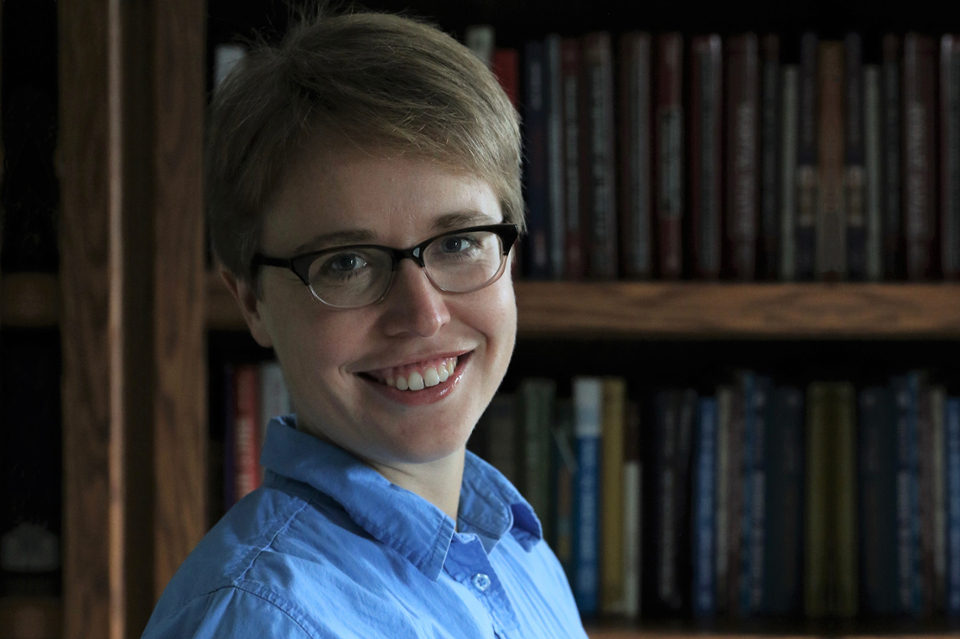Natalie Cornett PhD'21 Researches Rosa Luxemburg to Examine National Identity, Women’s Rights, and International Labor Movements

August 3, 2021
Carey Slaeker | Graduate School of the Arts and Sciences
Natalie Cornett is advancing her academic and career goals with a two-year postdoctoral research fellowship hosted at McGill University. Having successfully defended her dissertation in June, Cornett is excited for the chance to continue her academic and professional growth. “It is quite an opportunity,” she says. “This fellowship will allow me to pursue my research and publication goals, expand my professional network, and also gives me the option to teach my own history courses.”
Cornett’s journey to Brandeis began after a three-year pause from academic studies, following her completion of an undergraduate degree at the University of Toronto, and then a master’s degree at Jagiellonian University in Poland. While searching for a PhD program, Cornett was intrigued by Brandeis’ focus on Jewish studies as well as the reputation and expertise of its faculty, which “matched my thematic and geographical interests.”
After enrolling at Brandeis, Cornett was impressed by the close-knit community that she discovered. “I found a sense of camaraderie among my fellow students immediately upon starting the program.” The size and support of the Department of History fostered a conducive environment that she believes contributed to her success. “The relatively small size of the department and the fact that all PhD students receive funding for 5 years is a rarity that I thought was not only financially beneficial, but also encourages cohesion and community among fellow graduate students.” However, her favorite thing about the program was the freedom and support she received “creating my own research project from the ground-up in a stimulating academic environment.” She appreciated “exploring my research topic from different angles and disciplines and meeting new people and forming long-term friendships.”
Cornett started applying to postdoctoral positions three years ago. “I wanted to continue working in academia and I had an idea for another research project as I was finishing my dissertation,” she says. However, this fellowship, funded by the Quebec Research Fund (Fonds de recherche du Québec, FRQ), was especially attractive: “This one was special and required about 2 months of preparation to apply on account of the many parts of the application that cover an applicant’s professional competencies, proposed project and suitability to the host environment.” With the support of her dissertation advisor Gregory Freeze, Cornett was pleased to embrace the opportunity.
Her research for the fellowship will focus on Rosa Luxemburg (1871-1919), a socialist revolutionary from a Jewish-Polish household in Warsaw. To the left of many of her international, socialist contemporaries, Luxemburg sought to build a grassroots and democratic socialism by starting radical political organizations in the Russian Empire and Germany. For her project, “Róża’s World: Rosa Luxemburg, Partitioned Poland, and Socialist Internationalism (1893-1919),” Cornett plans to use Luxemburg as a lens that she hopes will help her explore the larger issues of her time. “Her personal background combined with her complex political thinking make her a particularly compelling figure through which to view larger debates surrounding national identity, women’s rights, and international labor movements,” Cornett says. These themes connect with those found in Cornett’s dissertation, “The Politics of Love: The ‘Enthusiasts’ and Feminism of Nineteenth-Century Poland,” where Cornett examined the early Polish women’s movement using letters, diaries and police files pertaining to an educated women’s circle called the “Enthusiasts” (Entuzjastki). For this new project, Cornett hopes that her study will “intervene in this discussion and widen our knowledge of women’s participation in social movements, the role of affect among socialist revolutionaries, and how emancipation and communal identities were framed by various thinkers at the turn of the century.”
Cornett certainly appreciates the mentorship and counsel she has received from faculty at Brandeis which has helped facilitate her current momentum. “Over the years, I’ve received support from my advisor, Gregory Freeze, who has provided feedback on my materials, as well as from other faculty members in my department who have shared some of their previous application materials with me or looked over my own materials.” Of her experience at Brandeis, she concludes: “Overall, my experience taught me how to be a better researcher and writer. I was allowed the independence and flexibility needed to create and execute a large research project and this will serve me well as I launch a second major project.”
To students considering pursuing a PhD in History, Cornett advises: “Think of a historical problem or question that particularly interests you and then read as much as you can about it before applying. If you’re still interested in the question after having read through lots of material, and you see places in the literature where you could intervene, then you have the start of a project and should apply.”
Cornett will publish her first book, The Politics of Love: Gender and Nation in Nineteenth-Century Poland, in 2024. GSAS interviewed her about the publishing process.






